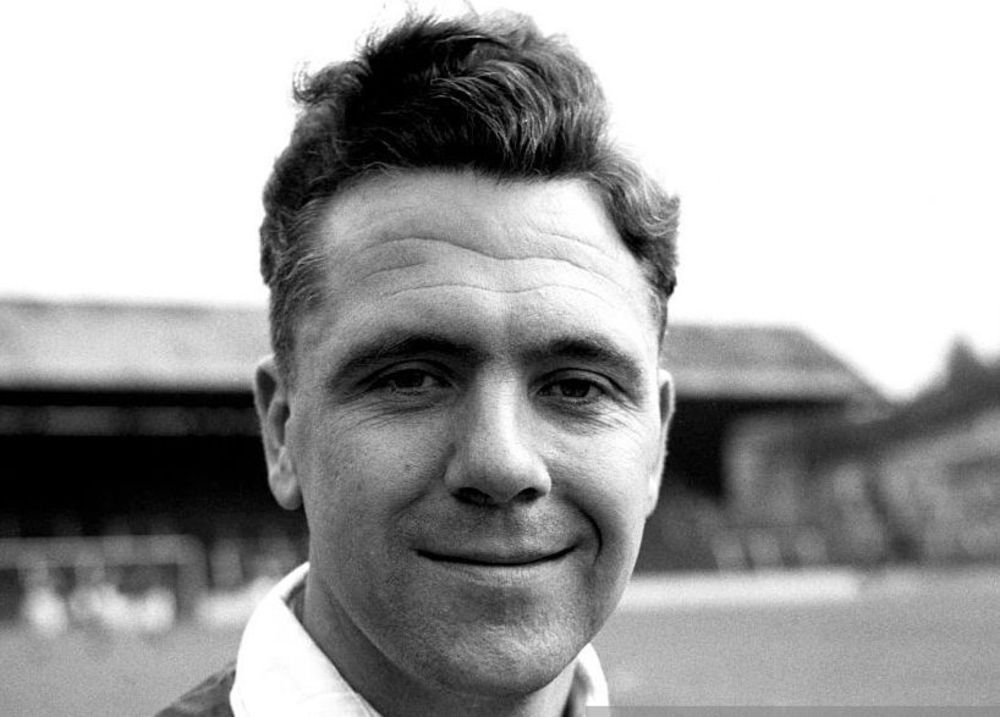
Frank Lock
Frank Lock was born in Whitechapel and played for Middlesex Schools and Finchley as an amateur before joining the Army.
After this, the left-back signed professional forms for Charlton Athletic in December 1945 where he made 221 appearances scoring 8 goals.
His debut came in September 1947 before a crowd of 58,000 at Highbury against Arsenal. Charlton lost the match 6-0 but Lock must have done something right as from that day, the number three shirt became his own.
He went on an FA tour of Australia in 1951 and was decidedly unlucky not to be selected for the full England side.
On Christmas Day 1953, he signed for Liverpool to bolster an increasingly fragile defence and made a total of 41 appearances for the Reds, the last of which came at Middlesbrough towards the end of April 1955.
Lock then joined Third Division Watford where he made 42 appearances and scored one goal before moving to Southern League side Cambridge United in July 1957.
Lock's association with Clacton Town then began when he first joined as a player where he was a consistent performer in Roy Bicknell's 1959/60 Southern League First Division title-winning side and then later became manager of the Seasiders on two separate occasions.
He also managed Clacton's reserves for a while as well as playing for them in his 50's.
He continued to play on and on as late as 1981 and into his 61st year when still a regular Sunday League footballer!
He passed away in 1985 and was buried with the football boots which he had worn with distinction over so many years.
Had it not been for a knee injury, then the career of Alan Beer could have been very different to what it was.
The injury ended his playing days, just as he was on the verge of a £70,000 move to First Division Leicester City and the winning of a full international cap for Wales.
A former Wales amateur international, Beer had played in local football in the Swansea area for Tower United and West End before he signed professional forms for Swansea City in February 1971.
He scored 3 goals in 15 appearances for the Swans.
He dropped out of the Football League though when signing for Southern Premier Division Weymouth in August 1972.
He prospered under the management of fellow Welshman Graham Williams and was the supporters` player of the year in his first season with the Terras.
He scored 82 goals in 137 games for Weymouth and his goalscoring ability was noted by Exeter City, who paid a fee of £8,000 for him in November 1974.
Beer made his Grecians debut at Rochdale the same month and scored in the 1-1 draw and was the club’s top scorer in 1975/76 with 20 goals in 46 appearances, and the following season played a prominent part, alongside Tony Kellow, in scoring the goals that took Exeter to promotion to the Third Division with 21 goals in 38 outings.
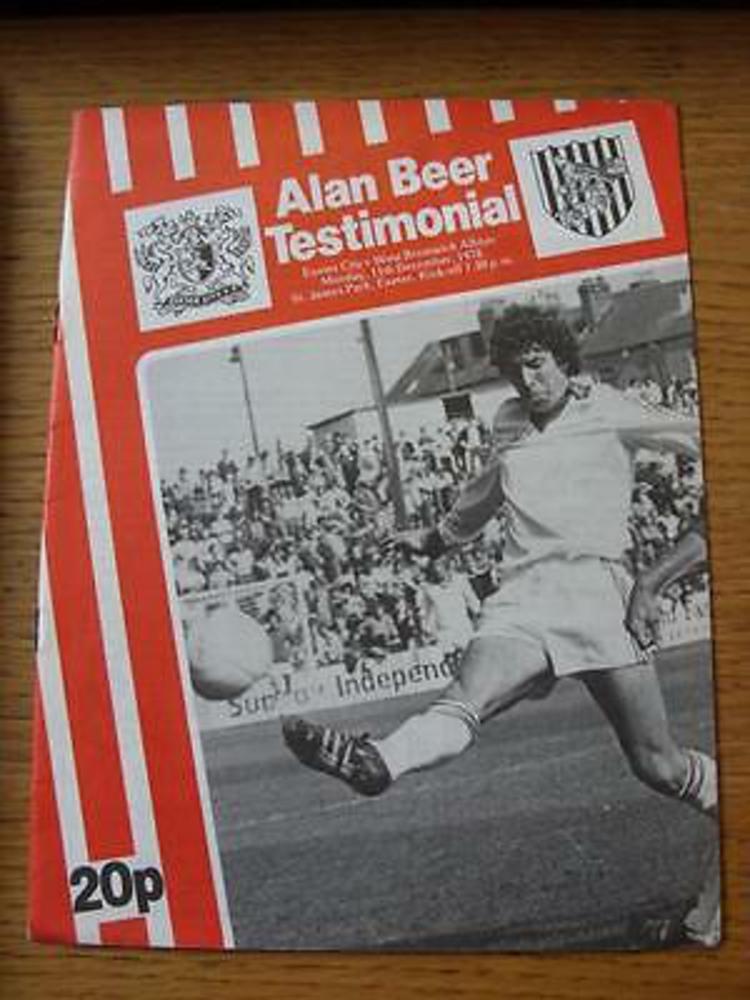
Alan Beer Testimonial programme
Beer was picked as one of the 24 players in the Welsh squad for the home internationals in the summer of 1977 but didn’t get a call up into the team.
A knee injury sustained in only the third league match of the 1977/78 season at Shrewsbury Town, having already scored 2 goals that season, ended his playing days.
On medical advice, he eventually retired from playing in August 1978 after making 114 appearances and scoring 52 goals for Exeter.
In December 1978 Beer had a testimonial match played on his behalf between Exeter City and West Bromwich Albion.
He returned to the Swansea area and later worked for Bassetts Honda.
Another Welshman, former schoolboy international goalkeeper John Black, played for Swansea City in the 1964/65 Welsh Cup semi-final.
Signing professional for Arsenal in February 1963, he helped them win the Football Combination title that season but failed to secure a first-team slot and moved to the Vetch Field in December 1964.
He made his Football League debut in Swansea's 4-0 win at home to Preston North End three months later and played 15 games prior to joining Southern Premier Division side Worcester City in November 1965.
He later returned to Wales and played for Ammanford.
Birmingham-born Alan Wright joined Walsall as a youngster but made only one League appearance before moving into non-League football with Weymouth in 1960.
A tough-tackling wing-half who could also play centre-half, he soon became a regular there and remained until Basil Hayward, who would have had plenty of chances to see him when managing nearby Yeovil Town, signed him for Southern League rivals Bedford Town in the summer of 1964 for a £500 fee, which was to turn out to a be a real bargain!
His consistency and application soon made him popular with supporters and he became a key part of Hayward's team that threatened to challenge seriously for honours in 1965/66.
In the FA Cup run of that season, he held the defence together well as acting captain in the two Second Round matches against Brighton & Hove Albion.
During the relegation season of 1966/67, he fell out with Hayward's successor, Ron Burgess, and almost left the club, but the return of Ron Heckman as manager seems to have solved that problem and Wright, as captain, was a key figure in the promotion team of 1967/68.
By early March 1969, however, the Eagles were back where they had been two years previously and with relegation virtually certain, Heckman was sacked, and Wright was appointed player-manager.
Persistent injuries had restricted Wright to only 15 appearances in 1968/69, but he recovered well enough to be almost ever-present in 1969/70 as his team made short work of another immediate return to the Premier Division, finishing as champions of the First Division and hitting 91 goals in the process.
In the following season, although the team established itself back in the top division without too many problems, there was almost no money to spare for players and Wright himself was increasingly struggling with injuries and appeared only 8 times, 6 of the appearances being at the start of the season.
He announced that he was making an all-out effort to be fit for the start of 1971/72 but after playing in a pre-season friendly he broke down again and was advised to retire immediately.
In his absence, the team started indifferently and after Witney Town, of the Hellenic League, had knocked them out of the FA Cup in the Second Qualifying Round towards the end of October, Wright was sacked and left the Eagles after making 288 appearances and scoring 10 goals.
He remained involved in local football for many years, having several spells managing Kempston Rovers (for whom he made a brief return as a player), Wootton Blue Cross and Raunds Town as well as being assistant manager at Kettering Town for a while in the mid-70s.
Bob Stockley spent three years at Coventry City, playing in the 1968 FA Youth Cup final, before joining Poole Town in the Southern League.
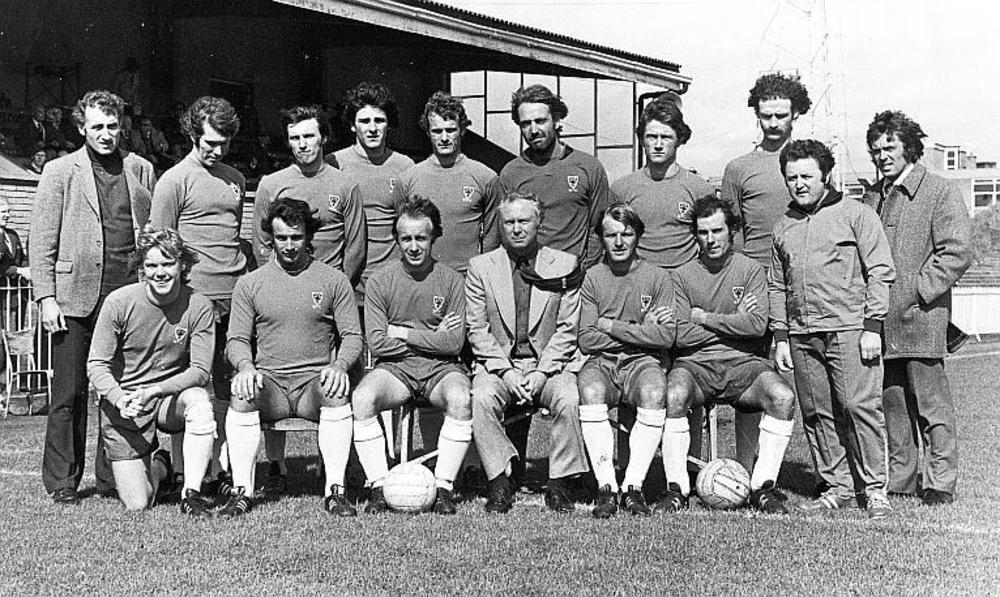
Giantkillers Wimbledon with Bob Stockley front left kneeling
He then signed for rivals Wimbledon, then under Mike Everitt, during the 1972 close season and played more often at full-back.
Despite being almost ever-present during the Dons' historic 1974/75 season, when they enjoyed their marvellous FA Cup run when they beat Burnley and held then-mighty Leeds United to a 0-0 draw at Elland Road before losing the replay 1-0 at Selhurst Park and then went on to win the Southern League title.
A suspension meant Stockley missed the start of the following season and after a spell in the reserves, he joined Atherstone Town in October 1975 for a nominal £300 fee.
He moved on to Nuneaton Borough in 1978 and then to Banbury United in October 1982.
He made 28 appearances for the Puritans in 1982/83 and 41 in 1983/84, in the latter season he was club captain.
Following the resignation of Wilf Tranter as manager at the end of June 1984, Banbury promptly appointed Stockley as his replacement at the beginning of July.
However, the Board decided that it wasn`t going to be possible for Banbury United to participate in competitive football during 1984/85.
But, on the following Monday, agreement was reached with former player and manager Brian Stone to come in and take Board level responsibility for all playing matters to ensure another season of Southern League football at the Spencer Stadium.
The club was to run, at least initially, on an amateur ethos in terms of paying the players though Stone promised a `professional` approach in terms of commitment and organisation.
The lack of funds meant there was to be a reliance on local players and there was, therefore, no place for Bob Stockley as manager and his five-week reign as manager was thus the shortest in the club’s history!
After leaving Banbury, he played for Coventry Sporting, AP Leamington and Bedworth United.
He spent the second half of the 1990s as assistant manager at Atherstone United and then coached at AA Stockingford, Coalville Town, Barrow Town and Bedworth United.
Forward Gary Birch began his career with Walsall as a trainee, where he was highly rated.
He signed a full contract for the Saddlers in October 1998 and eventually totalled 68 appearances for the club, scoring 7 goals.
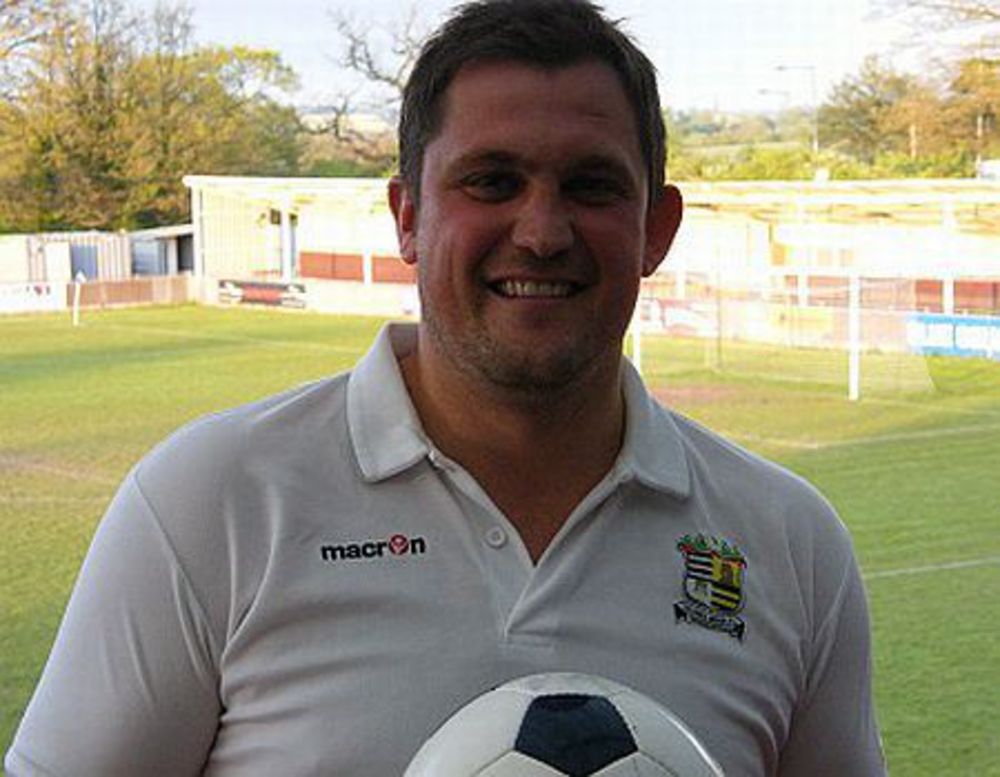
Gary Birch
The first of his loan spells at Exeter City commenced in March 2001, when he made his Grecians’ debut as a substitute in a 2-1 home win over Kidderminster Harriers.
Scoring twice in 9 first-team outings, Birch returned to Walsall at the end of the season.
He was back at St James` Park though in August 2001 for another loan spell, and this time failed to hit the target in 5 starts and 10 substitute appearances.
His loan travels were not over though, as Walsall allowed him to make a temporary move to Barnsley in March 2004, where he scored twice in 8 appearances.
In December 2004, Birch left Walsall to sign for Kidderminster Harriers.
After being loaned to Nuneaton Borough, he then played for Lincoln City and Hucknall Town – both on loan - prior to signing for AFC Telford United in January 2007.
Birch was further loaned out to Southern League Division One Midlands side Rushall Olympic in September 2007 and then signed for league rivals Chasetown.
He departed from the club in June 2012 and signed for then-Conference North outfit Solihull Moors.
Birch stepped into management with, briefly Highgate United and then in October 2014 until May 2016 with Lichfield City in the Midland League.
In November 2016 he was appointed as boss of then-Northern Premier League Premier Division outfit Hednesford Town.
However, in March 2017 Birch was announced as the new manager of Midland League Premier Division side Walsall Wood just 24 hours after stepping down at Hednesford.
Les Blizzard had short spells as a professional with Queens Park Rangers and Bournemouth immediately after the Second World War, making a handful of appearances for both, tragically breaking his leg on debut for the Cherries which turned out to be his only game for them.
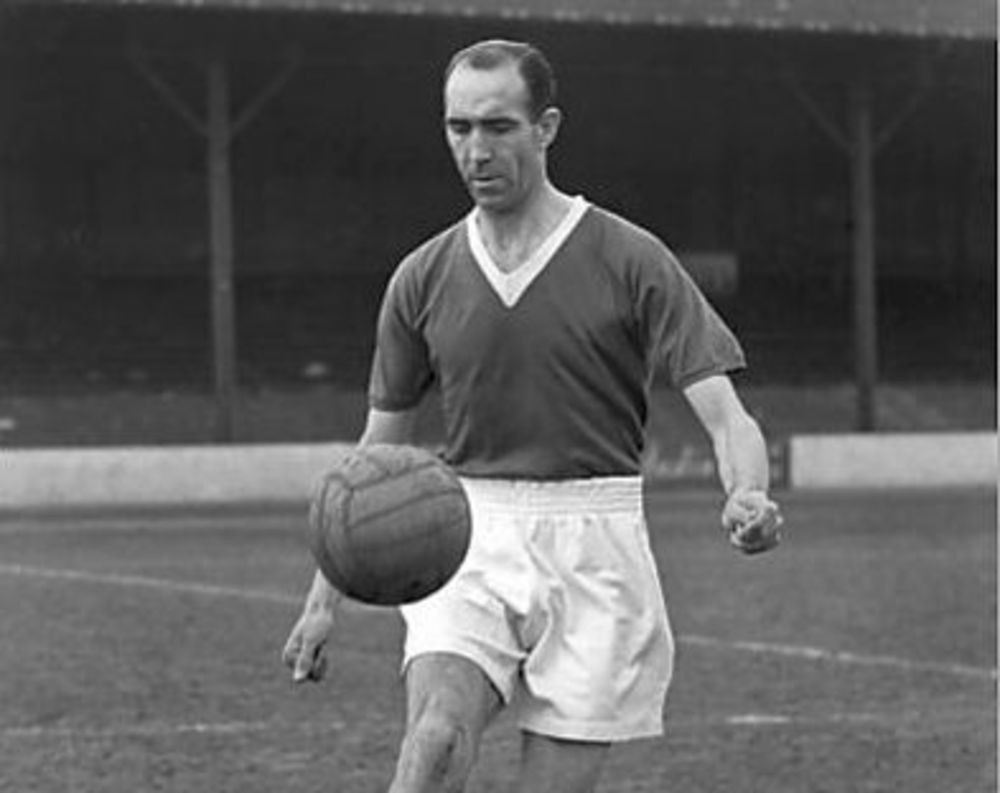
Les Blizzard
He joined Southern League Yeovil Town in May 1948 and featured in their infamous FA Cup run the following season, when they beat Sunderland before losing in front 81,000 against Manchester United.
Blizzard was the archetypal `stopper` centre-back of the day and was already attracting League scouts before his impressive display against First Division Sunderland.
He was considered the best in his position in the Southern League, and it came as little surprise when he was the first player Yeovil boss Alec Stock took with him when he took the Leyton Orient post in 1949.
And Blizzard became a big favourite at Brisbane Road, going on to make 222 appearances and score 12 goals before retiring in 1957 to resume his career as an electrician.
Dave Silman was a centre-back with Wolverhampton Wanderers, Queens Park Rangers and Brentford, for whom he played just the once in the first team in 1978.
Spells with Walthamstow Avenue, Enfield and Dagenham followed before he joined Hayes from Harrow Borough in the summer of 1985.
Over two seasons he made 84 appearances for Hayes and scored 8 goals.
He later played for Ruislip Manor and Staines Town before playing in the Southern League for Hounslow in 1988/89 and 1989/90
Utility player Michael Tuohy was on Wolverhampton Wanderers` books as a schoolboy before joining Aston Villa in the summer of 2003.
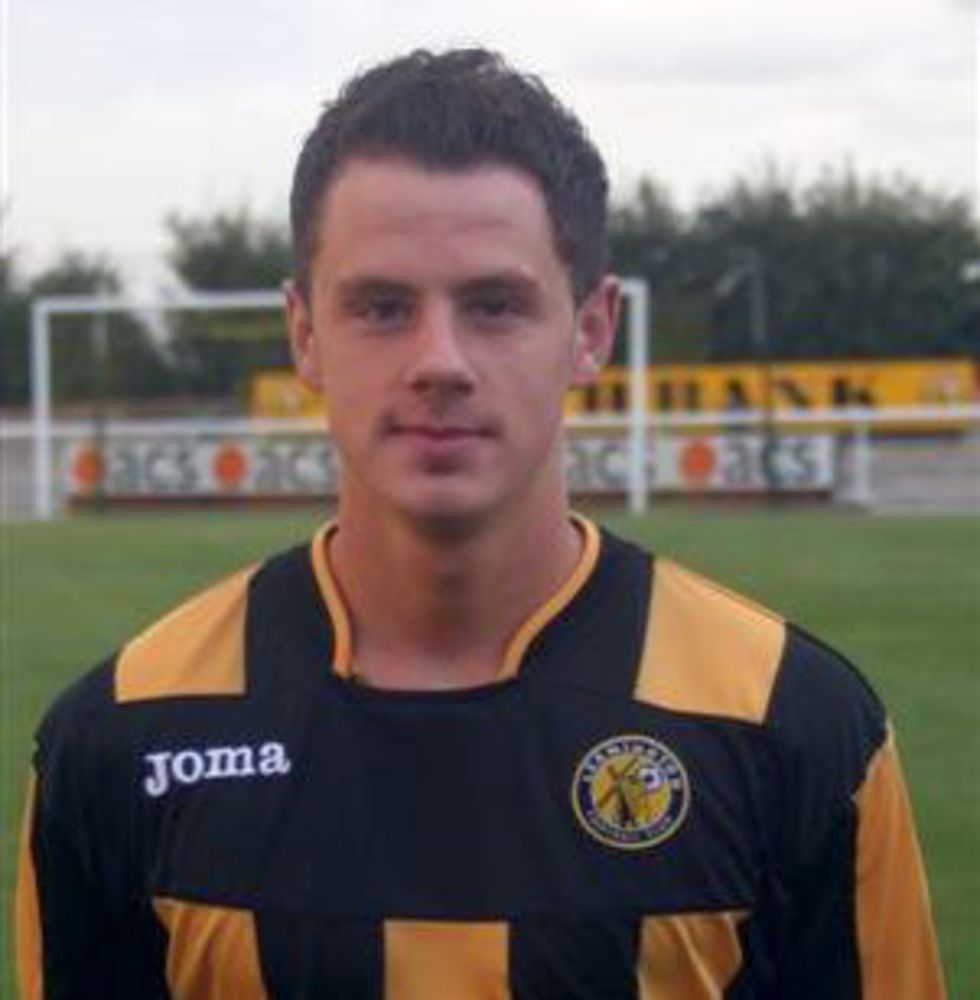
Michael Tuohy
He became a regular in Villa`s under-18 and reserve sides but was released at the end of the 2004/05 season.
He trialled with Walsall but in August 2005 made the surprise move to an Ilford side who had been switched to the Southern League Eastern Division after a non-League Pyramid re-structure by the FA.
But after only a few weeks with the East London outfit, Tuohy returned to the Midlands to join Conference side Tamworth in October 2005 and featured in the Lambs` FA Cup victory over AFC Bournemouth and a Third Round defeat by Stoke City.
He remained with Tamworth until the end of the 2007/08 season, but a serious ankle injury restricted his appearances during the latter part of him time at The Lamb.
In the summer of 2008, Tuohy moved to Conference North side Solihull Moors before switching to Stratford Town, then in the Midland Alliance, towards the end of the 2008/09 campaign.
In May 2009, he signed for Southern Premier Division outfit Leamington, although they loaned him back to Stratford for a spell during the 2009/10 season.
He remained with the Brakes until September 2012 when he re-located to Kent after his girlfriend obtained a job in Gillingham.
He left Leamington having made 130 appearances and scored 5 goals and it was his versatility that would be a big loss to the club.
In October 2012, Tuohy trialled with Isthmian League Premier Division side Margate but suffered a knee injury in a League Cup tie against the Metropolitan Police and had to be stretchered off – it turned out to be his only appearance for Gate.
Bob Lamie was a Scottish winger who was initially with Lanarkshire junior side Stonehouse Violet.
He joined Cardiff City in October 1949 and made his League debut in the following month's 1-0 defeat at home to West Ham United.
He moved to Swansea Town in March 1951 and deputised for Jack O'Driscoll in a 2-2 draw at Nottingham Forest October 1951.
His only other Second Division appearance was in the Swans' 3-2 defeat at home to Queens Park Rangers two months later.
He joined Lincoln City in October 1952 but left soon afterwards without making a senior appearance for the Imps.
Lamie was then signed by fellow Scot Bob Calder for Southern League Kettering Town.
He had a couple of seasons with the Poppies but left just before the Tommy Lawton era at Rockingham Road began.
He had a spell in the Birmingham Combination with Bedworth Town before hanging up his boots.
He passed away in Northampton in August 1981, aged just 53.
Left-back Jack Harrop was a former Charlton Athletic amateur who represented the Army during his National Service and signed professional with Swansea Town in August 1952.
He was given his League debut in Swansea's 3-1 defeat at Fulham eight months later and helped win the Football Combination Second Division title in 1954/55, making 10 Second Division appearances prior to joining Watford in July 1956.
He featured in the Hornets` 1959/60 promotion campaign, and, although his last 6 first-team games for the club all ended in defeat, by then he`d given three seasons of good service and made 111 appearances without scoring.
He went on to play in the Southern League for Hastings United and later Tunbridge Wells United until 1962.
Harrop later became cricket coach at Dulwich College, but died in Hemel Hempstead in February 1977, aged just 48.
Goalkeeper Gary Steel started his career with Charlton Athletic.
He didn`t make the senior side at The Valley, mostly turning out for the colts` side.
He moved to Southend United ahead of the 1968/69 season and it was whilst with the Shrimps that he had his first taste of Southern League football with a loan spell at Premier Division Margate in January 1970.
His stay at Hartsdown Park saw him play 29 times.
He was released by Southend at the end of the 1969/70 season and signed for another Southern Premier outfit, King`s Lynn, in the summer of 1970.
However, Steel`s first season with the Linnets saw them relegated from the Premier Division, but he stayed at The Walks for another three seasons in Division One North before being signed by Barry Fry for Dunstable Town in the summer of 1974.
It was an exciting time to be at Creasey Park as Fry led Dunstable to promotion to the Premier Division in 1974/75 with a team including the likes of former West Bromwich Albion and England centre-forward Jeff Astle, Jackie Scurr, George Cleary and Trevor Peck.
As financial turmoil began at the club, Steel left to join Isthmian League Division One side Leytonstone ahead of the 1976/77 season and then to Isthmian Premier outfit Hendon the following season.
Barry Fry then re-signed him for Southern Premier Division Barnet in the summer of 1978 and was the Bees` keeper as they became founder members of the Alliance Premier League before losing his place to Gary Phillips and then retiring during the 1981/82 campaign through injury.
Wellingborough-born right back Tim Wooding joined Norwich City as a YTS trainee but only because he had poor GSCE results following injury suffered as a spectator during the Hillsborough disaster in April 1989.
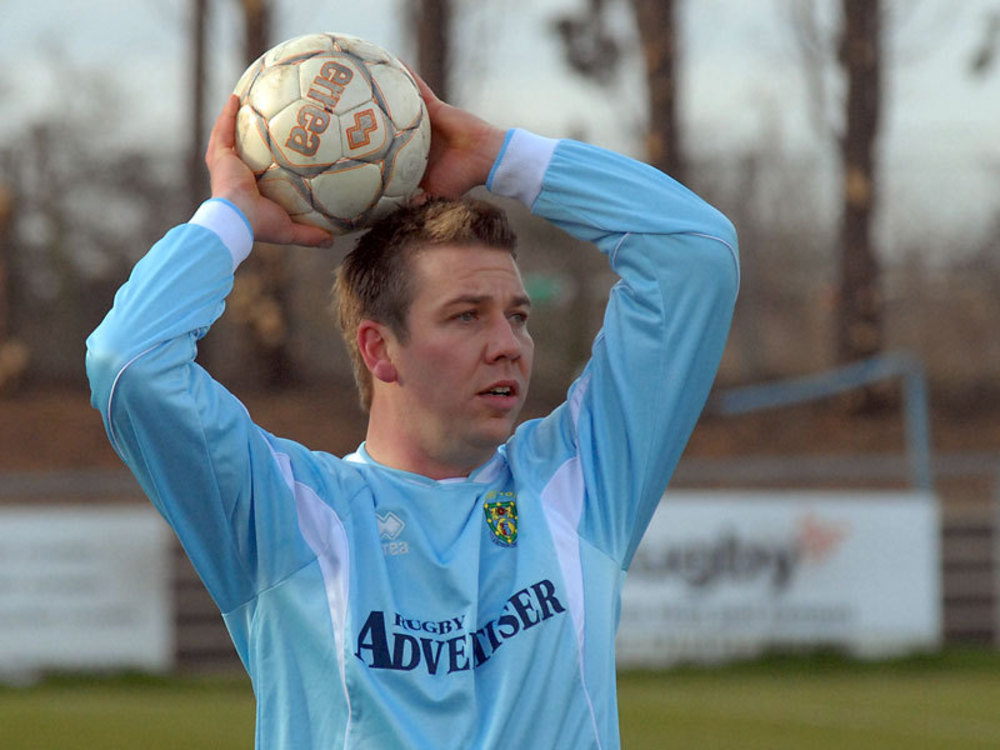
Tim Wooding (Rugby Town FC)
He moved down the south coast to join AFC Bournemouth but failed to make the breakthrough at Dean Court and returned to Northamptonshire signed for the emerging Rushden & Diamonds in the Southern League Midland Division in February 1994.
And he helped Roger Ashby`s side on a 20-game unbeaten run which led them to win the Midland Division title.
Wooding went on to play around 250 games for Diamonds, netting 15 times and helped the ambitious outfit to win promotion to the Conference.
Then, in May 2000, he signed for Conference new boys Boston United who won the 1999/00 Southern League championship.
He moved to Southern Premier Division side Cambridge City on loan in December 2000 in a move that became permanent in February 2001.
He was transfer-listed by Cambridge in December 2002, two days after the sacking of manager David Batch and the club announced that Wooding and his former Diamonds` team-mate Darren Collins would be suspended from first-team selection until a new manager was appointed.
Although Collins was transferred to Tamworth, Wooding settled his differences and came off the list.
He was said to be looking forward to working with new manager Graham Roberts. However, this didn't last for long and in August 2003 Wooding parted company with Cambridge to sign for Grantham Town, now being managed by ex-Diamonds` boss Roger Ashby.
He made 98 appearances for the Gingerbreads before being released and joining Southern Premier Division Rugby Town in 2005.
He made 25 appearances for Rugby before leaving in May 2006 to join newly-promoted United Counties League Premier Division side Wellingborough Town where several of his former Diamonds` team-mates had assembled under player-boss Nick Ashby.

Most clubs are looking for volunteers. Find out more on the button below:
www.PitchingInVolunteers.co.ukAll the news and results in one place.
REGISTER